- Home
- Robert E. Howard
Bran Mak Morn: The Last King Page 16
Bran Mak Morn: The Last King Read online
Page 16
Through the throng came a wolf: and he knew that it was the wolf whom he had rescued from the panther close by the ravine in the forest!
Strange, how long ago and far away that seemed! Yes, it was the same wolf. That same strange, shambling gait. Then the thing stood erect and raised its front feet to its head. What nameless horror was that?
Then the wolf� head fell back, disclosing a man� face. The face of a Pict; one of the first �erewolves.�The man stepped out of the wolfskin and strode forward, calling something. A Pict just starting to light the wood about the Briton� feet drew back the torch and hesitated.
The wolf-Pict stepped forward and began to speak to the chief, using Celtic, evidently for the prisoner� benefit. (Cororuc was surprized to hear so many speak his language, not reflecting upon its comparative simplicity, and the ability of the Picts.)
�hat is this?�asked the Pict who had played wolf. � man is to be burned who should not be!� �ow?�exclaimed the old man fiercely, clutching his long beard. �ho are you to go against a custom of age-old antiquity?� � met a panther,�answered the other, �nd this Briton risked his life to save mine. Shall a Pict show ingratitude?� And as the ancient hesitated, evidently pulled one way by his fanatical lust for revenge, and the other by his equally fierce racial pride, the Pict burst into a wild flight of oration, carried on in his own language. At last the ancient chief nodded.
� Pict ever paid his debts,�said he with impressive grandeur. �ever a Pict forgets. Unbind him. No Celt shall ever say that a Pict showed ingratitude.� Cororuc was released, and as, like a man in a daze, he tried to stammer his thanks, the chief waved them aside.
� Pict never forgets a foe, ever remembers a friendly deed,�he replied.
�ome,�murmured his Pictish friend, tugging at the Celt� arm.
He led the way into a cave leading away from the main cavern. As they went, Cororuc looked back, to see the ancient chief seated upon his stone throne, his eyes gleaming as he seemed to gaze back through the lost glories of the ages; on each hand the fires leaped and flickered. A figure of grandeur, the king of a lost race.
On and on Cororuc� guide led him. And at last they emerged and the Briton saw the starlit sky above him.
�n that way is a village of your tribesmen,�said the Pict, pointing, �here you will find a welcome until you wish to take up your journey anew.� And he pressed gifts on the Celt; gifts of garments of cloth and finely worked deerskin, beaded belts, a fine horn bow with arrows skilfully tipped with obsidian. Gifts of food. His own weapons were returned to him.
�ut an instant,�said the Briton, as the Pict turned to go. � followed your tracks in the forest. They vanished.�There was a question in his voice.
The Pict laughed softly, � leaped into the branches of the tree. Had you looked up, you would have seen me. If ever you wish a friend, you will ever find one in Berula, chief among the Alban Picts.� He turned and vanished. And Cororuc strode through the moonlight toward the Celtic village.
Poem
Previously published as �he Drums of Pictdom�
How can I wear the harness of toil
And sweat at the daily round,
While in my soul forever
The drums of Pictdom sound?
Miscellanea
NOTES ON MISCELLANEA
Two of Howard� stories of the Picts, written only about two years apart, present strikingly different conceptions of the eventual fate of the race. In The Little People, probably written in 1928, Howard suggests that �he legend is that these Picts, whom the Celts looked upon as scarcely human, fled to caverns under the earth and lived there, coming out only at night, when they would burn, murder, and carry off children for their bloody rites of worship.�The story, clearly influenced by Arthur Machen� The Shining Pyramid (which itself serves as a plot device to set Howard� tale in motion), makes the Picts a race of underground dwellers with �tunted bodies, . . . gnarled limbs, . . . snake-like, beady eyes that stared unwinkingly, . . . grotesque, square faces with their unhuman features. . . .� But in The Children of the Night, written about two years later, the author says that the Picts, as well as the Celts, despise these loathsome underground dwellers, now called Children of the Night. And to compound the problem, in The People of the Dark, written in 1931, Howard makes the linkage between The Little People and The Children of the Night explicit: they are both names for the same race of pre-Pictish inhabitants of the British Isles, driven underground and devolved to a state scarcely human. In both of these latter two stories, the �hildren�or �ittle People�are said to be descended from a �ongoloid�race that inhabited Europe before the coming of, first, the Picts, and then the Celts.
Given the internal consistency in Howard� other tales of the Picts, this difference in relating their ultimate fate may strike the reader as odd. What happened is that, in August 1930, weird fictionist H. P. Lovecraft had written Howard a letter in which he expounded a theory, supposedly subscribed to by archaeologists, that the �editerraneans�(Howard� �icts�, who spread over Europe and the British Isles before the coming of the Celts, were themselves preceded on the Continent by �he squat Mongoloids now represented by the Lapps,�who, in the wake of conquest first by the Mediterraneans and then by �ordics,��ook to deep woods & caves, & survived for a long time as malignantly vindictive foes . . . sinking so low in the anthropological scale that they became bywords of dread and repulsion.�Howard immediately adopted this idea.
In these stories, racial memory and ancient tribal hatreds play a prominent role. Without attempting to excuse this, we should understand the context in which these stories were created. Racialism, in the years before Hitler, was quite intellectually acceptable. Prominent scientists, naturalists, and philosophers promoted theories of racial differences that, generally, �roved�the superiority of white Europeans, many going so far as to suggest that only whites were capable of cultural creation and innovation. Some went even further, and subdivided white Europeans into separate �aces,�to show that Northern Europeans (Aryans, or Nordics) were superior to Slavs (Alpines) and Southern Europeans (Mediterraneans). A focus of anthropology and archaeology was the idea of a volk, or ethnic/racial group, that had a unique language, used specific types of artifacts, and maintained an unique behavioral identity. Rooted in the nationalism prevalent at the time, these ideas were propounded by such eminent scholars as Gustaf Kossina and V. Gordon Childe. Social evolution was seen by these scholars as being due to a hazily defined �acial/ethnic vigor,�intellectual and linguistic superiority, and hard work. �ocial Darwinism,�the idea that the theory of evolution applied to individuals and societies, as well as species, was in vogue, and �urvival of the fittest�meant that the most vigorous races would survive. Many writers undertook to warn the white race that they could not be complacent in the face of the rising power of the �olored�world, lest they lose their favored position. It was the heyday of eugenics, the science dealing with the �mproving�of races through the control of genetic factors, to be accomplished by restrictions on reproduction among those with �nferior�genes. The intelligence testing movement was gaining steam, using spurious (or simply fabricated) data to �rove�that some races of mankind were more innately intelligent than others. Much of this pseudo-science, or selective presentation of data in support of preconceived biases, was widely accepted at the time, and was used as evidence when the United States established strict immigration quotas in 1924, giving preference to Northern Europeans. Even scientists who disavowed racism and discrimination, such as Franz Boas (Howard� �oaz�, still spent a great deal of time and effort in studying and attempting to isolate the physical characteristics of races.
Perhaps most importantly, for Robert E. Howard, one of his favorite writers, Jack London, promulgated many of these ideas in his work. Influenced by many of these prominent thinkers, such as Herbert Spencer (who coined the term �urvival of the fittest,�and from whose work
Social Darwinism grew) and Ernst Haeckel (who first posited that �ntogeny recapitulates phylogeny,�that the biological development of the individual reproduces the evolutionary stages of its species, and who wrote that Negroes were �ncapable of a true inner culture and of a higher mental development�, London was in his turn a profound influence on Howard. (In fact, in some of his letters Howard discusses Spencer and Haeckel, to whose ideas he may have been first introduced by London.)
In Howard� stories of racial memory, such as The Little People and The Children of the Night, can be clearly seen the strong influence of London� works, including The Human Drift, Before Adam, and perhaps most importantly, The Star-Rover, � book that I�e read and re-read for years, and that generally goes to my head like wine.�The thousand-year-long treks, the superior Aryans or Nordics driving the �esser breeds�before them, the �creaming primordial savagery,�and the narrator who can vividly recall all his past incarnations, encoded as they are into his very genetic structure, �acial memories,�all are borrowings from London, to which Howard adds a passionate intensity and story-telling verve all his own. The ideas may be rooted in discredited pseudo-science, but there� no denying the power of the stories.
Rusty Burke 2001
With thanks to Dr. Mark Hall
The Little People
[originally untitled]
The Little People
My sister threw down the book she was reading. To be exact, she threw it at me.
�oolishness!�said she. �airy tales! Hand me that copy of Michael Arlen.� I did so mechanically, glancing at the volume which had incurred her youthful displeasure. The story was �he Shining Pyramid�by Arthur Machen.
�y dear girl,�said I, �his is a masterpiece of outre literature.� �es, but the idea!�she answered. � outgrew fairy tales when I was ten.� �his tale is not intended as an exponent of common-day realism,�I explained patiently.
�oo far-fetched,�she said with the finality of seventeen. � like to read about things that could happen �who were �he Little People�he speaks of, the same old elf and troll business?� �ll legends have a base of fact,�I said. �here is a reason �� �ou mean to tell me such things actually existed?�she exclaimed. �ot!� �ot so fast, young lady,�I admonished, slightly nettled. � mean that all myths had a concrete beginning which was later changed and twisted so as to take on a supernatural significance. Young people,�I continued, bending a brotherly frown on her pouting lips, �ave a way of either accepting entirely or rejecting entirely such things as they do not understand. The �ittle People�spoken of by Machen are supposed to be descendants of the prehistoric people who inhabited Europe before the Celts came down out of the North.
�hey are known variously as Turanians, Picts, Mediterraneans, and Garlic-eaters. A race of small, dark people, traces of their type may be found in primitive sections of Europe and Asia today, among the Basques of Spain, the Scotch of Galloway and the Lapps.
�hey were workers in flint and are known to anthropologists as men of the Neolithic or polished stone age. Relics of their age show plainly that they had reached a comparatively high stage of primitive culture by the beginning of the bronze age, which was ushered in by the ancestors of the Celts �our prehistoric tribesmen, young lady.
�hese destroyed or enslaved the Mediterranean peoples and were in turn ousted by the Teutonic tribes. All over Europe, and especially in Britain, the legend is that these Picts, whom the Celts looked upon as scarcely human, fled to caverns under the earth and lived there, coming out only at night, when they would burn, murder, and carry off children for their bloody rites of worship. Doubtless there was much in this theory. Descendants of cave people, these fleeing dwarfs would no doubt take refuge in caverns and no doubt managed to live undiscovered for generations.� �hat was a long time ago,�she said with slight interest. �f there ever were any of those people they�e dead now. Why, we�e right in the country where they�e supposed to perform and haven� seen any signs of them.� I nodded. My sister Joan did not react to the weird West country as I did. The immense menhirs and cromlechs which rose starkly upon the moors seemed to bring back vague, racial memories, stirring my Celtic imagination.
�aybe,�I said, adding unwisely, �ou heard what that old villager said �the warning about walking on the fen at night. No one does it. You�e very sophisticated, young lady, but I�l bet you wouldn� spend a night alone in that stone ruin we can see from my window.� Down came her book and her eyes sparkled with interest and combat.
��l do it!�she exclaimed. ��l show you! He did say no-one would go near those old rocks at night, didn� he? I will, and stay there the rest of the night!� She was on her feet instantly and I saw I had made a mistake.
�o, you won�, either,�I vetoed. �hat would people think?� �hat do I care what they think?�she retorted in the up to date spirit of the Younger Generation.
�ou haven� any business out on the moors at night,�I answered. �ranting that these old myths are so much empty wind, there are plenty of shady characters who wouldn� hesitate to harm a helpless girl. It� not safe for a girl like you to be out unprotected.� �ou mean I� too pretty?�she asked naively.
� mean you�e too foolish,�I answered in my best older brother manner.
She made a face at me and was silent for a moment and I, who could read her agile mind with absurd ease, could tell by her pensive features and sparkling eyes exactly what she was thinking. She was mentally surrounded by a crowd of her cronies back home and I could guess the exact words which she was already framing: �y dears, I spent a whole night in the most romantic old ruin in West England which was supposed to be haunted �� I silently cursed myself for bringing the subject up when she said abruptly, �� going to do it, just the same. Nobody will harm me and I wouldn� pass up the adventure for anything!� �oan,�I said, � forbid you to go out alone tonight or any other night.� Her eyes flashed and I instantly wished I had couched my command in more tactful language. My sister was willful and high spirited, used to having her way and very impatient of restraint.
�ou can� order me around,�she flamed. �ou�e done nothing but bully me ever since we left America.� �t� been necessary,�I sighed. � can think of a number of pastimes more pleasant than touring Europe with a flapper sister.� Her mouth opened as if to reply angrily then she shrugged her slim shoulders and settled back down in her chair, taking up a book.
�lright, I didn� want to go much anyhow,�she remarked casually. I eyed her suspiciously; she was not usually subdued so easily. In fact some of the most harrowing moments of my life have been those in which I was forced to cajole and coax her out of a rebellious mood.
Nor was my suspicion entirely vanquished when a few moments later she announced her intention of retiring and went to her room just across the corridor.
I turned out the light and stepped over to my window, which opened upon a wide view of the barren, undulating wastes of the moor. The moon was just rising and the land glimmered grisly and stark beneath its cold beams. It was late summer and the air was warm, yet the whole landscape looked cold, bleak and forbidding. Across the fen I saw rise, stark and shadowy, the rough and mighty spires of the ruins. Gaunt and terrible they loomed against the night, silent phantoms from
[A page appears to be missing from Howard� typescript here.]
she assented with no enthusiasm and returned my kiss in a rather perfunctory manner. Compulsory obedience was repugnant.
I returned to my room and retired. Sleep did not come to me at once however, for I was hurt at my sister� evident resentment and I lay for a long time, brooding and staring at the window, now framed boldly in the molten silver of the moon. At length I dropped into a troubled slumber, through which flitted vague dreams wherein dim, ghostly shapes glided and leered.
I awoke suddenly, sat up and stared about me wildly, striving to orient my muddled senses. An oppressi
ve feeling as of impending evil hovered about me. Fading swiftly as I came to full consciousness, lurked the eery remembrance of a hazy dream wherein a white fog had floated through the window and had assumed the shape of a tall, white bearded man who had shaken my shoulder as if to arouse me from sleep. All of us are familiar with the curious sensations of waking from a bad dream �the dimming and dwindling of partly remembered thoughts and feelings. But the wider awake I became, the stronger grew the suggestion of evil.

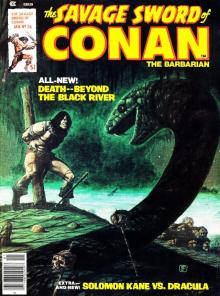 Beyond the Black River
Beyond the Black River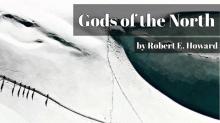 Gods of the North
Gods of the North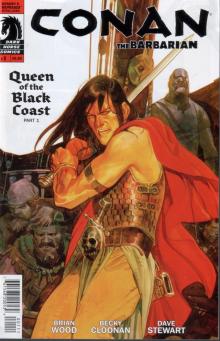 Queen of the Black Coast
Queen of the Black Coast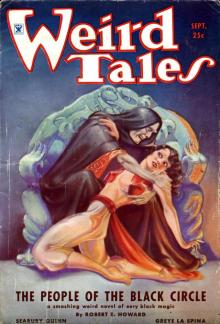 The People of the Black Circle
The People of the Black Circle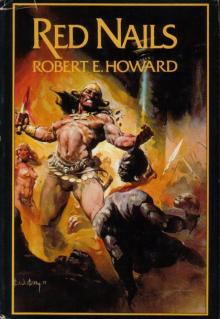 Red Nails
Red Nails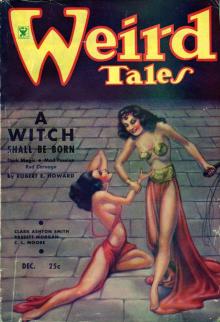 A Witch Shall Be Born
A Witch Shall Be Born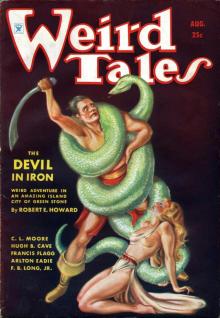 The Devil in Iron
The Devil in Iron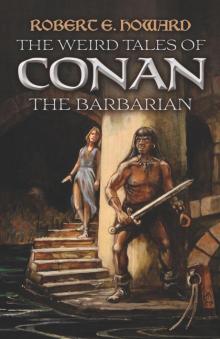 The Weird Tales of Conan the Barbarian
The Weird Tales of Conan the Barbarian The Bloody Crown of Conan
The Bloody Crown of Conan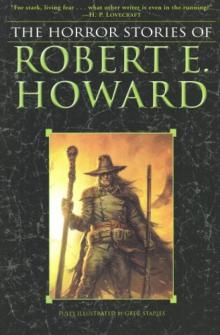 The Horror Stories of Robert E. Howard
The Horror Stories of Robert E. Howard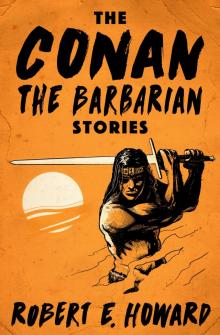 Conan the Conqueror
Conan the Conqueror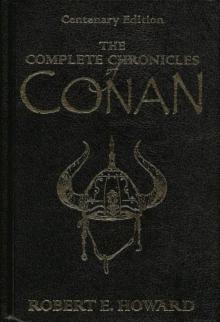 Conan the Barbarian
Conan the Barbarian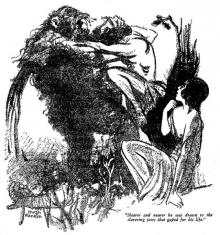 Shadows in the Moonlight
Shadows in the Moonlight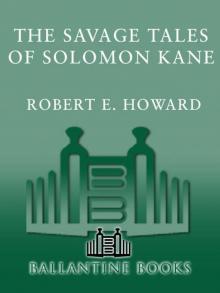 The Savage Tales of Solomon Kane
The Savage Tales of Solomon Kane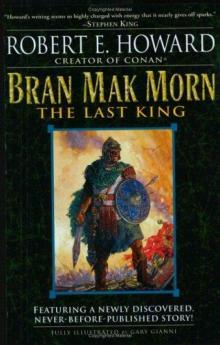 Bran Mak Morn: The Last King
Bran Mak Morn: The Last King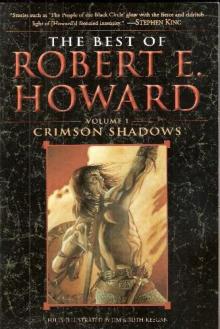 The Best of Robert E. Howard Volume One: Crimson Shadows
The Best of Robert E. Howard Volume One: Crimson Shadows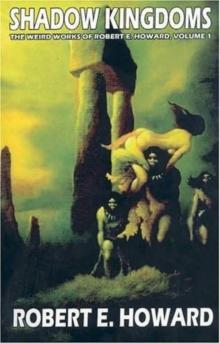 The Best of Robert E. Howard: Crimson Shadows (Volume 1)
The Best of Robert E. Howard: Crimson Shadows (Volume 1)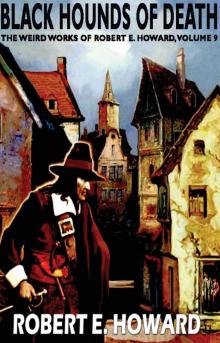 Black Hounds of Death
Black Hounds of Death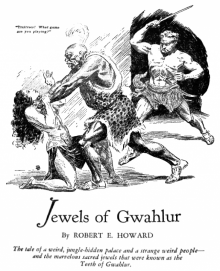 Jewels of Gwahlur
Jewels of Gwahlur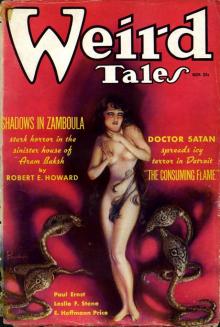 Shadows in Zamboula
Shadows in Zamboula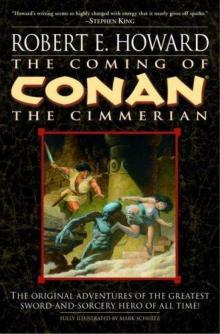 The Coming of Conan the Cimmerian
The Coming of Conan the Cimmerian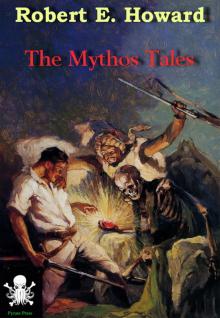 The Mythos Tales
The Mythos Tales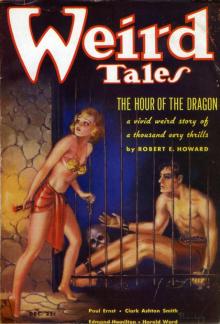 The Hour of the Dragon
The Hour of the Dragon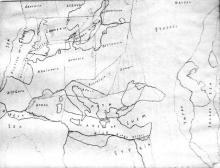 The Hyborian Age
The Hyborian Age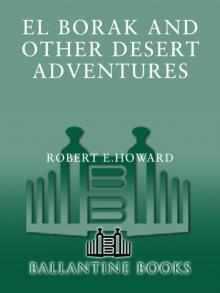 El Borak and Other Desert Adventures
El Borak and Other Desert Adventures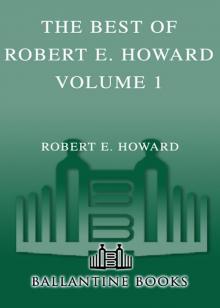 The Best of Robert E. Howard Volume 1 The Best of Robert E. Howard Volume 1
The Best of Robert E. Howard Volume 1 The Best of Robert E. Howard Volume 1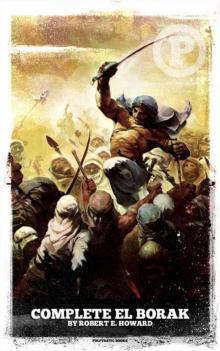 El Borak: The Complete Tales
El Borak: The Complete Tales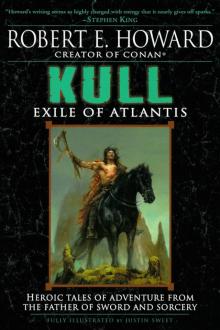 Kull: Exile of Atlantis
Kull: Exile of Atlantis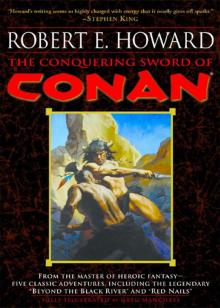 The Conquering Sword of Conan
The Conquering Sword of Conan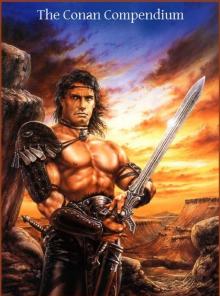 The Conan Compendium
The Conan Compendium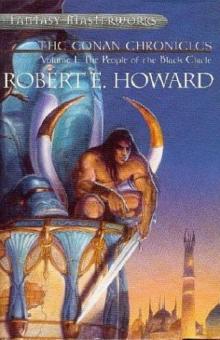 The Conan Chronicles: Volume 1: The People of the Black Circle
The Conan Chronicles: Volume 1: The People of the Black Circle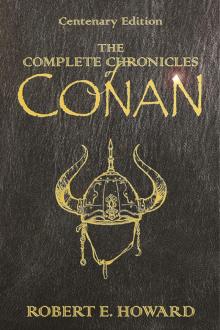 The Complete Chronicles of Conan: Centenary Edition
The Complete Chronicles of Conan: Centenary Edition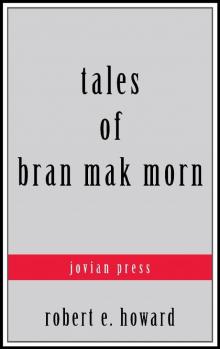 Tales of Bran Mak Morn (Serapis Classics)
Tales of Bran Mak Morn (Serapis Classics)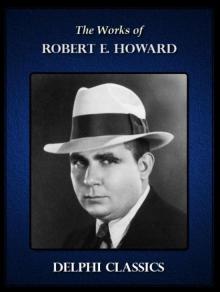 Delphi Works of Robert E. Howard (Illustrated) (Series Four)
Delphi Works of Robert E. Howard (Illustrated) (Series Four)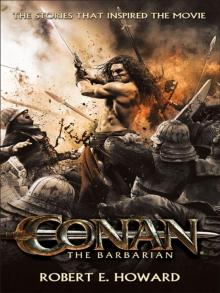 Conan the Barbarian: The Stories That Inspired the Movie
Conan the Barbarian: The Stories That Inspired the Movie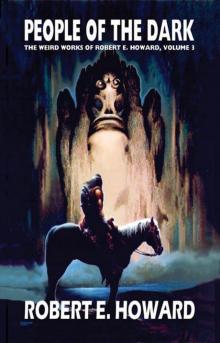 People of the Dark Robert Ervin Howard
People of the Dark Robert Ervin Howard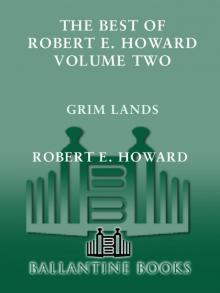 Grim Lands
Grim Lands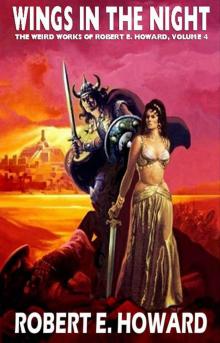 Wings in the Night
Wings in the Night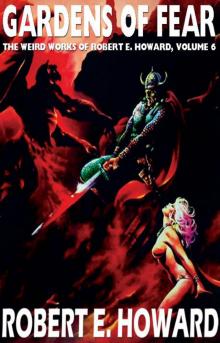 Gardens of Fear
Gardens of Fear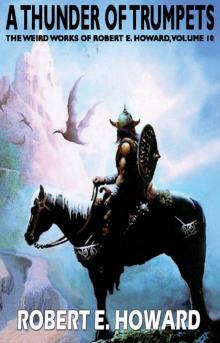 A Thunder of Trumpets
A Thunder of Trumpets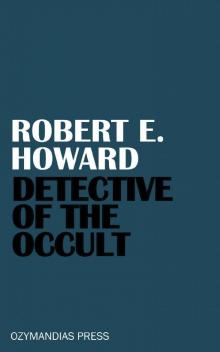 Detective of the Occult
Detective of the Occult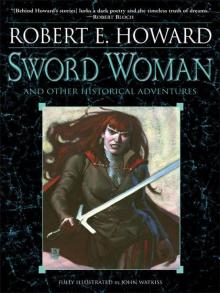 Sword Woman and Other Historical Adventures
Sword Woman and Other Historical Adventures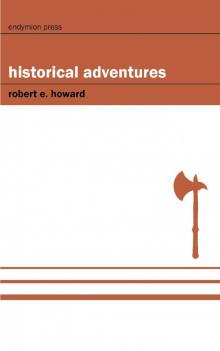 Historical Adventures
Historical Adventures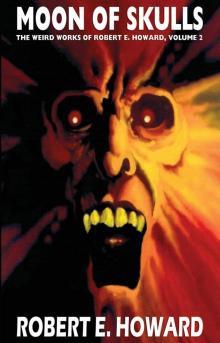 Moon of Skulls
Moon of Skulls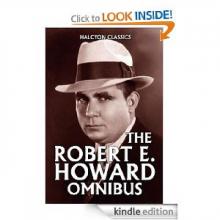 The Robert E. Howard Omnibus: 97 Collected Stories
The Robert E. Howard Omnibus: 97 Collected Stories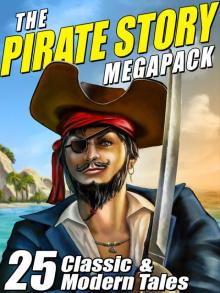 The Pirate Story Megapack: 25 Classic and Modern Tales
The Pirate Story Megapack: 25 Classic and Modern Tales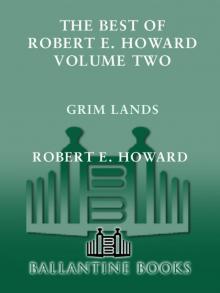 The Best of Robert E. Howard, Volume 2
The Best of Robert E. Howard, Volume 2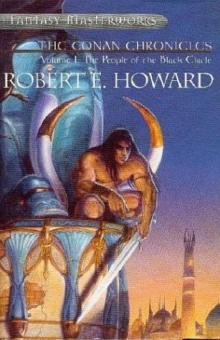 The Conan Chronicles, Vol. 1: The People of the Black Circle
The Conan Chronicles, Vol. 1: The People of the Black Circle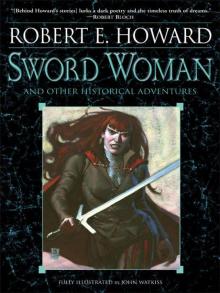 Sword Woman and Other Historical Adventures M
Sword Woman and Other Historical Adventures M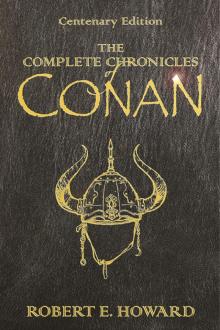 The Complete Chronicles of Conan
The Complete Chronicles of Conan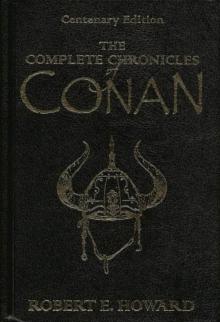 Conan the Barbarian: The Chronicles of Conan (collected short stories)
Conan the Barbarian: The Chronicles of Conan (collected short stories)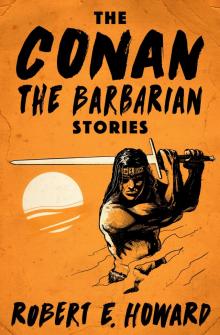 The Conan the Barbarian Stories
The Conan the Barbarian Stories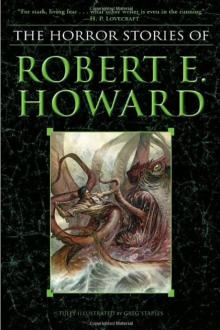 The Best Horror Stories of
The Best Horror Stories of Tigers Of The Sea cma-4
Tigers Of The Sea cma-4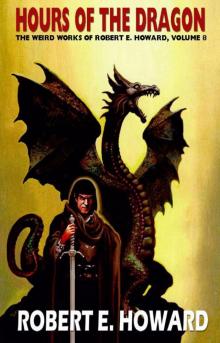 The Hours of the Dragon
The Hours of the Dragon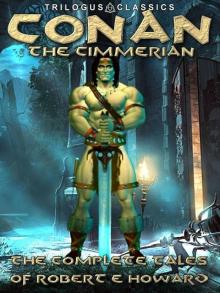 Conan the Cimmerian: The Complete Tales (Trilogus Classics)
Conan the Cimmerian: The Complete Tales (Trilogus Classics)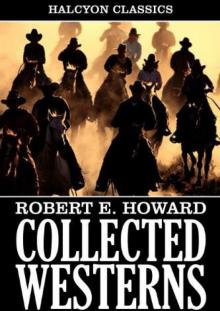 Collected Western Stories of Robert E. Howard (Unexpurgated Edition) (Halcyon Classics)
Collected Western Stories of Robert E. Howard (Unexpurgated Edition) (Halcyon Classics)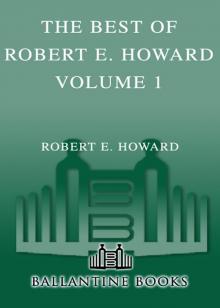 The Best of Robert E. Howard, Volume 1
The Best of Robert E. Howard, Volume 1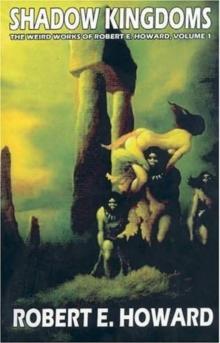 Shadow Kingdoms
Shadow Kingdoms